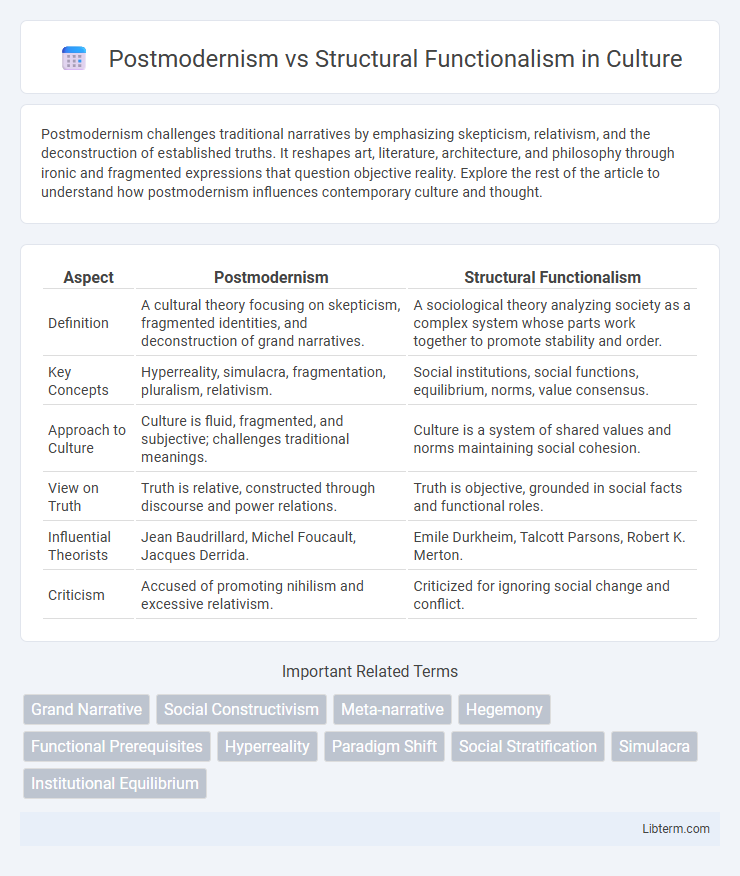Postmodernism challenges traditional narratives by emphasizing skepticism, relativism, and the deconstruction of established truths. It reshapes art, literature, architecture, and philosophy through ironic and fragmented expressions that question objective reality. Explore the rest of the article to understand how postmodernism influences contemporary culture and thought.
Table of Comparison
| Aspect | Postmodernism | Structural Functionalism |
|---|---|---|
| Definition | A cultural theory focusing on skepticism, fragmented identities, and deconstruction of grand narratives. | A sociological theory analyzing society as a complex system whose parts work together to promote stability and order. |
| Key Concepts | Hyperreality, simulacra, fragmentation, pluralism, relativism. | Social institutions, social functions, equilibrium, norms, value consensus. |
| Approach to Culture | Culture is fluid, fragmented, and subjective; challenges traditional meanings. | Culture is a system of shared values and norms maintaining social cohesion. |
| View on Truth | Truth is relative, constructed through discourse and power relations. | Truth is objective, grounded in social facts and functional roles. |
| Influential Theorists | Jean Baudrillard, Michel Foucault, Jacques Derrida. | Emile Durkheim, Talcott Parsons, Robert K. Merton. |
| Criticism | Accused of promoting nihilism and excessive relativism. | Criticized for ignoring social change and conflict. |
Introduction to Postmodernism and Structural Functionalism
Postmodernism challenges traditional narratives by emphasizing subjective experiences, fragmented realities, and the fluidity of knowledge, contrasting sharply with Structural Functionalism's focus on social structures and their role in maintaining societal stability. Structural Functionalism, rooted in the works of Emile Durkheim and Talcott Parsons, views society as a complex system whose parts work together to promote solidarity and functionality. Postmodernism rejects these universal frameworks, advocating for multiple interpretations and questioning the existence of overarching social laws.
Historical Context and Development
Postmodernism emerged in the mid-20th century as a reaction against the grand narratives and objective truths championed by Structural Functionalism, which dominated the early to mid-1900s. Structural Functionalism, rooted in the works of Emile Durkheim and later Talcott Parsons, focused on social stability and cohesion during periods of rapid industrialization and modernization. Postmodernism arose alongside the cultural upheavals of the 1960s and 1970s, challenging the deterministic and positivist frameworks by emphasizing relativism, fragmentation, and the deconstruction of meta-narratives.
Core Principles of Structural Functionalism
Structural Functionalism emphasizes society as a complex system whose parts work together to promote stability, order, and social cohesion. Core principles include the concepts of social institutions functioning to meet societal needs, social structures guiding individual behavior, and the maintenance of equilibrium through social norms and values. This perspective contrasts with Postmodernism's skepticism of grand narratives, highlighting instead predictable patterns and systemic functions within society.
Key Tenets of Postmodernism
Postmodernism challenges grand narratives and objective truths, emphasizing the fluidity of meaning and the role of language in shaping reality. It critiques structural functionalism's focus on social order and stability by highlighting power dynamics, fragmentation, and multiple perspectives. Central to postmodernism are deconstruction, skepticism toward universal explanations, and the celebration of diversity and subjective experiences.
Approaches to Social Reality
Postmodernism challenges traditional approaches to social reality by emphasizing fragmented, subjective experiences and rejecting overarching metanarratives, whereas Structural Functionalism views social reality as a stable, interrelated system with clearly defined functions that maintain social order. Structural Functionalism interprets society through objective, measurable institutions and roles, while Postmodernism highlights power dynamics, discourse, and the plurality of meanings shaping individual and collective identities. These contrasting approaches reflect deep epistemological differences in understanding social structures and human agency.
Notions of Power and Authority
Postmodernism challenges traditional notions of power and authority, emphasizing their fluid, decentralized, and socially constructed nature, whereas Structural Functionalism views power and authority as stable, institutionalized elements essential for maintaining social order. In Postmodern thought, power is fragmented and exercised through discourse and cultural practices, undermining universal truths or grand narratives upheld by authoritative institutions. Structural Functionalism, rooted in functional integration, sees authority as necessary for role allocation and norm enforcement to sustain societal equilibrium.
Perspectives on Social Change
Postmodernism challenges the fixed narratives of social change by emphasizing fragmented identities, pluralism, and the deconstruction of grand theories. Structural functionalism views social change as a gradual process aimed at maintaining social stability and equilibrium through adaptive adjustments in social institutions. While postmodernism highlights contradictions and power dynamics in societal shifts, structural functionalism underscores the role of interrelated social structures working harmoniously for systemic continuity.
Criticisms and Limitations
Postmodernism critiques Structural Functionalism for its emphasis on social order and stability, arguing it overlooks power dynamics and societal inequalities. Structural Functionalism is limited by its tendency to ignore individual agency and the complexities of social change, often portraying society as a harmonious system. Both perspectives face challenges in addressing the fluidity of social identities and the impact of postmodern cultural shifts on traditional functionalist frameworks.
Contemporary Relevance and Applications
Postmodernism challenges traditional narratives by emphasizing the fragmented, subjective nature of reality, which influences contemporary cultural studies, media analysis, and identity politics. Structural Functionalism remains relevant in analyzing social institutions and their roles in maintaining societal stability and cohesion, particularly in policy development and organizational theory. Both frameworks offer critical insights essential for addressing complex social dynamics and evolving power structures in modern societies.
Conclusion: Bridging or Contrasting the Theories
Postmodernism challenges the fixed meanings and overarching narratives emphasized by Structural Functionalism, promoting diverse interpretations and skepticism toward established social structures. Structural Functionalism, centered on social stability and integration through systemic functions, contradicts the fluid, fragmented perspectives of Postmodernism. Bridging these theories requires a nuanced approach that acknowledges the stability of social systems while embracing the multiplicity of meanings and power dynamics highlighted by Postmodernism.
Postmodernism Infographic

 libterm.com
libterm.com